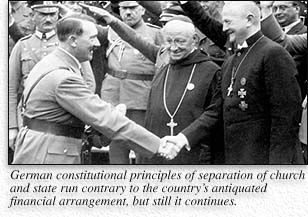

The incestuous relationship between church and state in Germany was authored by Hitler—and persists to this day.


n 1919, the Weimar Republic mandated that the state subsidy of churches should cease. But, in reality, this mandate was breached before the ink used to write it was dry. Only fourteen years later, the arrangement was a matter of law.
In the years leading up to Hitler’s assumption of total state power, the most serious potential opposition to his mad solutions were those within Germany’s Catholic and Lutheran churches who objected to the excesses of National Socialism.
Historically, churches and religions have, more than once, played the role of society’s only check against political oppression. Accordingly, governments have often harbored hostility towards them—particularly since they postulate a higher authority than the state.
But Hitler circumvented that problem in 1933. In return for maintaining state support for the churches, Hitler secured an agreement that the churches would not oppose the National Socialists’ rise to power.
Practically overnight, both churches developed active participation in advancing the goals of the Nazis. The Lutheran press began to talk of the Jews as the “natural enemies” of Christianity. The Catholic Church even agreed to an oath of fealty to be taken by all bishops, agreeing “Before God and on the Holy Gospels I swear and promise—as becomes a bishop—loyalty to the German Reich and to the state ... and to cause the clergy of my diocese to honor it.”
In accepting Hitler’s deal, the churches sold any role they held as Germany’s moral lightning rod.
At war’s end, the allied forces crafted a new constitution for Germany which guarantees religious freedom and separation of church and state. Yet, contrary to this, the financial arrangement remained in place.
The result? An incestuous relationship in which the churches are subverted by the holder of the purse strings—the government.
What should they have done? Factually, there is no better model than the one tested over the last two hundred years in the United States. Though it may have certain imperfections, the broad separation of church and state and a tolerance of religious diversity has brought a degree of freedom without historical parallel.
Those Germans still guilty of persecuting minorities are fond of saying, “Oh, you are too tolerant in America.” But separation of church and state has its own built-in safeguards. The U.S. government neither taxes nor funds religions. For any religion to survive in America, it has to be publicly supported.
Government Favoritism
How lucrative for the old churches is the system that remained in place?
The government, to this day, forces all German citizens to pay for the costs, payroll, construction fees and other expenses of churches selected for preferential treatment—the Catholic and Lutheran churches.
If he or she has not resigned his church membership, every German citizen pays a “church tax” to fund the operations of the Lutheran and Catholic churches, a system which sets Germany apart from all other nations. More than 17 billion DM—approximately $10 billion U.S.—are collected in church tax revenues annually and handed over directly to the churches.
Yet the income of these churches is supplemented by yet another 16.3 billion DM obtained from public funds collected by the government from all citizens, whether they belong to a church or not.
Individuals who forward Catholic and Lutheran aims in public institutions are also subsidized by the German government, such as religion teachers in schools, professors of theology, bishops and ministers in the army.
In addition to collecting their church tax, the government also subsidizes the churches in matters of property maintenance, renovation and construction to such a degree that these churches have amassed great material wealth. The total property covered by these churches is estimated at 5,000 square kilometers, which is considerably larger than one entire German state. And the value of this property is estimated in excess of 400 billion DM.
The financial involvement of the churches in banking, insurance, industrial enterprises and publishing houses is estimated at 15 billion DM annually, and the churches are shareholders in more than 140 newspapers and magazines.
Given this enormous and “automatic” funding engine, the churches’ active role in the political suppression of the Church of Scientology is hypocritical in the extreme—particularly when one considers their most common charge—that all new religious movements are “money motivated” and “amassing great fortunes.”
If anyone in Germany really believes that, there is an easy experiment they could do to test it: switch roles.
Hand the 16 billion DM to the Church of Scientology of Germany and tell them not to proselytize or accept individual donations from members. Meanwhile, cut all government funding for the old churches, but allow them to communicate freely with the German people and be as “money motivated” as they like and collect private donations without restraint. Existing on 1/1000th of their current income should be an interesting lesson in their brand of “religious freedom.”

